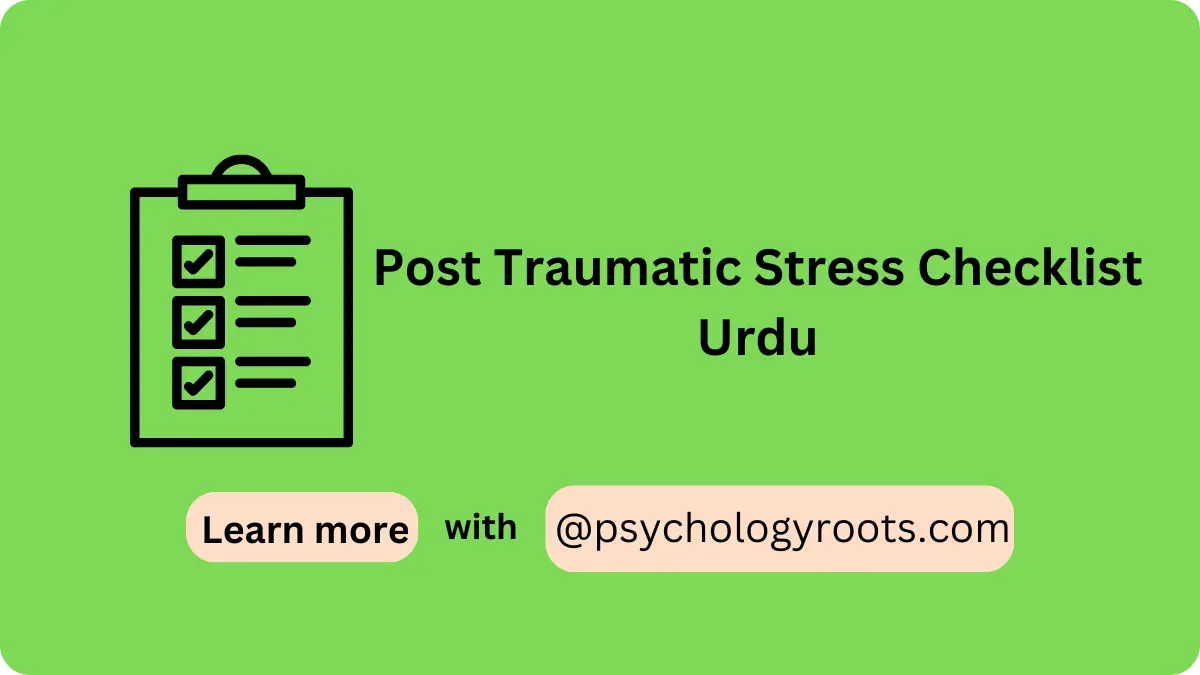Table of Contents
Post Traumatic Stress Checklist Urdu
Here in this post, we are sharing the “Post Traumatic Stress Checklist Urdu”. You can read psychometric and Author information. We have thousands of Scales and questionnaires in our collection (See Scales and Questionnaires). You can demand us any scale and questionnaires related to psychology through our community, and we will provide you with a short time. Keep visiting Psychology Roots.
About Post Traumatic Stress Checklist Urdu
Scale Name
Post Traumatic Stress Checklist Urdu
Author Details
Still searching
Translation Availability
Urdu

Background/Description
The Post Traumatic Stress Checklist (PCL) is a widely used self-report measure for assessing the presence and severity of symptoms related to Post-Traumatic Stress Disorder (PTSD). The original 17-item version of the PCL is based on DSM-IV criteria for PTSD and evaluates symptoms across three clusters: re-experiencing, avoidance/numbing, and hyperarousal.
The Urdu version of the PCL was developed to address the need for a culturally adapted tool that could be used with Urdu-speaking populations, particularly in contexts where trauma exposure is prevalent. This version retains the integrity of the original items while ensuring linguistic clarity and cultural sensitivity. The checklist has proven useful for clinicians, researchers, and mental health practitioners in identifying PTSD symptoms and monitoring treatment progress.
Administration, Scoring and Interpretation
- Obtain a copy: Secure a licensed copy of the PCL Urdu version through authorized channels or publishers.
- Explain the purpose: Inform the respondent about the purpose of the scale, emphasizing that it aims to assess symptoms of PTSD without making a diagnosis.
- Provide instructions: Guide the individual to read each item carefully and respond honestly based on their experiences in the past month.
- Approximate time: The scale typically takes 10–15 minutes to complete.
- Administer the scale: Offer a quiet and comfortable setting for the respondent to complete the checklist independently or with assistance, if required.
Reliability and Validity
N/A
Available Versions
17-Items
Reference
Still searching
Important Link
Scale File:
Disclaimer
Please note that Psychology Roots does not have the right to grant permission for the use of any psychological scales or assessments listed on its website. To use any scale or assessment, you must obtain permission directly from the author or translator of the tool. Psychology Roots provides information about various tools and their administration procedures, but it is your responsibility to obtain proper permissions before using any scale or assessment. If you need further information about an author’s contact details, please submit a query to the Psychology Roots team.
Help Us Improve This Article
Have you discovered an inaccuracy? We put out great effort to give accurate and scientifically trustworthy information to our readers. Please notify us if you discover any typographical or grammatical errors.
Make a comment. We acknowledge and appreciate your efforts.
Share With Us
If you have any scale or any material related to psychology kindly share it with us at psychologyroots@gmail.com. We help others on behalf of you.